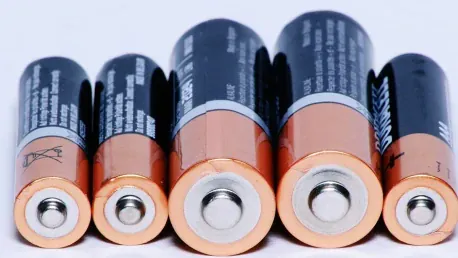Natron Energy, a company at the forefront of sodium-ion battery technology, is poised to make a significant impact on the U.S. energy landscape with the announcement of its ambitious plans to establish the first sodium-ion battery gigafactory in the country. Slated to be constructed in Edgecombe County, North Carolina, this groundbreaking facility represents an investment of nearly $1.4 billion. The gigafactory will cover a sprawling 1.2 million square feet at the 437-acre Kingsboro megasite, emphasizing both the scale and ambition of the project. Once fully operational, Natron Energy anticipates an annual production capacity of 24 GW of its proprietary sodium-ion batteries, which is 40 times their current production level. These advanced batteries aim to serve a wide array of sectors, including data centers, mobility, EV fast charging, microgrids, and telecommunications.
Unique Advantages of Sodium-Ion Batteries
High Power Density and Long Cycle Life
Natron Energy’s sodium-ion batteries offer several distinct advantages over conventional battery technologies, chief among them their higher power density and longer cycle life. The company’s focus on innovative sodium-ion technology positions it as a leader in the energy storage sector. The batteries feature patent-protected Prussian blue electrodes, which facilitate rapid sodium-ion storage and transfer with minimal internal resistance. This technology allows Natron’s batteries to cycle ten times faster than traditional lithium-ion batteries and provides a remarkable cycle life of over 50,000 cycles. Such attributes make these batteries particularly well-suited for applications requiring high power output and reliability over extended periods.
Another compelling feature of Natron’s sodium-ion batteries is their reliance on a fully domestic supply chain. Unlike lithium-ion batteries, which depend on scarce minerals such as lithium, cobalt, and nickel, Natron’s batteries are made using widely available materials like aluminum, iron, manganese, and sodium. This not only ensures a more stable supply but also positions the company as a more environmentally and socially responsible choice. By leveraging these common materials, Natron’s sodium-ion batteries offer a sustainable alternative, reducing both the environmental and geopolitical risks associated with traditional battery production. In an era where supply chain disruptions are increasingly common, the importance of domestic material sourcing cannot be overstated.
Domestic Supply Chain and Environmental Benefits
The reliance on commonly available materials addresses two key issues: sustainability and ethical sourcing. Unlike traditional battery production that often involves environmentally damaging mining practices and complicated geopolitics, Natron’s choice of aluminum, iron, manganese, and sodium is not only more abundant but also less harmful to extract. This approach significantly lowers the environmental footprint of its products. Moreover, the zero-strain design during charging and discharging cycles further enhances battery longevity and sustainability. Not only does this extend the battery’s usable life, but it also reduces the frequency of replacements, mitigating waste.
The company emphasizes that its sodium-ion technology stands as a robust alternative to conventional lead-acid and lithium-ion batteries. This commitment to environmental responsibility is crucial as more companies and municipalities look for greener alternatives to meet their energy needs. As such, Natron’s advanced battery technology aligns well with broader efforts to transition to more sustainable energy systems, amplifying its impact beyond its immediate market. This development, along with the company’s significant investment in research and technology, positions Natron Energy as a transformative force in the energy storage sector.
Strategic Location and Broader Impact
Significance of North Carolina Gigafactory Location
The decision to establish the gigafactory in North Carolina came after Natron Energy evaluated more than 70 potential sites across nine different states. Edgecombe County was ultimately chosen due to its strategic logistical advantages, access to a skilled workforce, and supportive local government. The 437-acre Kingsboro megasite offers ample space for future expansion, allowing Natron to scale up its operations as needed. Additionally, the local community is expected to benefit economically through job creation and increased business for local suppliers and contractors. This mutually beneficial relationship underscores the importance of choosing a location that aligns with both corporate and community goals.
Colin Wessells, Founder and co-CEO of Natron Energy, articulated the significance of this flagship facility, describing it as pivotal for advancing safe, reliable, and environmentally responsible energy solutions. This sentiment reflects the broader industry trend towards sustainable energy, with Natron’s investment serving as a substantial step in that direction. As more stakeholders recognize the importance of investing in green technology, projects like Natron’s gigafactory are likely to become more commonplace. This development appears at a time when sustainability is not just an option but a necessity for long-term economic and environmental health.
Aligning with National Energy Shifts
Natron Energy’s sodium-ion batteries offer numerous benefits over traditional battery technologies, particularly in terms of power density and cycle life. Their innovative approach using patent-protected Prussian blue electrodes enables rapid sodium-ion storage and transfer, resulting in minimal internal resistance. This allows Natron’s batteries to cycle ten times faster than conventional lithium-ion batteries, with an impressive cycle life exceeding 50,000 cycles. These qualities make them ideal for applications that demand high power output and reliable performance over extended periods.
In addition to their technical advantages, Natron’s sodium-ion batteries boast a fully domestic supply chain. Unlike lithium-ion batteries that rely on scarce minerals like lithium, cobalt, and nickel, Natron’s batteries are made from abundant materials such as aluminum, iron, manganese, and sodium. This not only ensures a stable supply but also makes the company a more environmentally and socially responsible choice. By using these common materials, Natron’s sodium-ion batteries provide a sustainable alternative, reducing environmental and geopolitical risks typically associated with battery production. In a time of frequent supply chain disruptions, domestic material sourcing is extremely valuable.









